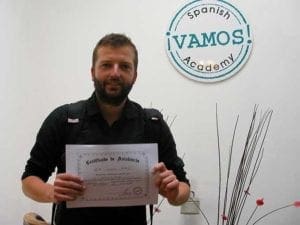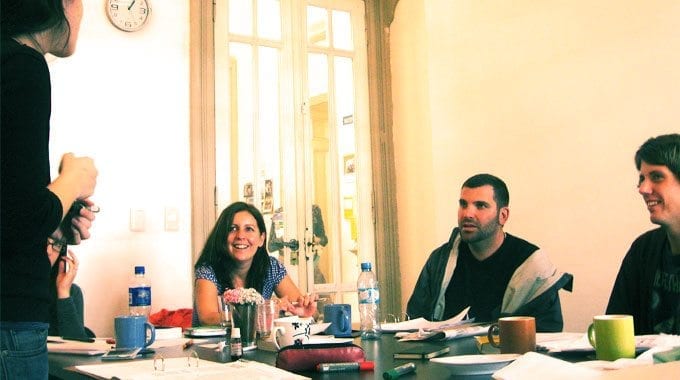My study abroad experience in Argentina


Having studied another language intensively in the past I knew that learning a language is more an art than science. It is not as binary as learning other subjects, like finance or math. I understood that everyone progresses at different paces. Progress is not only based on effort put in but also on what people’s mother tongues are and what other languages they know, along with their natural ability to pick up foreign languages.
So with this in mind here are some of my observations of learning Spanish!
Spanish Verb Conjugation
To me, and every other classmate I have had, verb conjugation is unanimously the most difficult part of learning Spanish. While the concept of verb conjugation is the same as in English, the particulars are much more complicated in Spanish.
Similar to English, Spanish has infinitives (infinitivos) as well as conjugated forms of the verbs. For example, to talk. In English, there are 2 conjugated forms in present tense: I/you/we/they talk, she/he/it talks. In Spanish, the infinitivo is hablar, and there are conjugated forms for each of the pronouns: yo hablo, vos hablás, ella/él habla, nosostro hablamos, ellos hablan. It only gets more complicated with past and future forms, as well as the multitude of irregular verbs (i.e. ir – to go, ser – to be, tener – to have, etc.).
Also read: Ways to put your Spanish to the test
Verb conjugation is key to learning Spanish and represents one of the most laborious parts of mastering the language. As a result, it is both extremely important and incredibly difficult!
The Speed Native Speakers Speak
I always thought that Chinese would be the most difficult language to understand through listening given its four tones but Spanish in Buenos Aires has been equally difficult. Porteños (natives of Buenos Aires) speak really fast and fluidly, sometimes mumbling a bit, almost to a point of pride. Thus, when you leave the classroom after listening to a teacher speaks clear Spanish and enter the real world, it can be a bit disheartening how little you understand. Now that I have lived here over a month I am improving at picking up on keywords throughout a conversation but still have a difficult time repeating a full sentence word for word. It is a long-term process and I think listening and speaking is always the most difficult part of learning a language!
The Difficulty of Studying Outside a Formal Classroom
Another obstacle I have faced that I had not previously thought of is the difficulty of studying outside of a formal classroom. Throughout my studies in university I always had the driving force of grades to provoke studying. I had to do homework, study for quizzes and tests, etc. for the sake of getting a good grade which I would in turn use to get a good job, etc. etc.
Studying Spanish now is solely a personal motivation. While I very much want to speak Spanish well and communicate in day-to-day life fluidly, I often find myself blowing off studying irregular past tense verbs in favor of going out to a parrilla (steak restaurant) with friends. Similar to when I was in formal school, procrastination is the enemy so it takes a lot of determination and self-will to study in free time!
Learning the Spanish Language When You Are Older
I know it seems a bit ironic for a 39-year-old to say that learning a language when you’re older is much more difficult and stressful than when younger, but it is! I have studied at Vamos for 5 weeks now and feel my Spanish has improved greatly. If I were at this level after studying Chinese for 5 weeks while in university I would have been ecstatic! But alas, I still find myself stressed out that I am not making enough progress. I either keep forgetting an irregular verb, I’m not studying enough grammar out of class, or when I enter the real world I have a tough time understanding locals speaking Spanish.
Also read: How to better understand local Spanish in Argentina
I think a large part of this is that as we grow older we don’t learn new things as often, like when we were at school. I have grown used to being good at the sports I participate in in my free time and my job because I have practiced for them my whole life. But learning a new language is eye opening – you have to have patience and realize it is a long, complicated process.
While all of the above comes off a bit discouraging, there have been many positives to learning Spanish in Buenos Aires too!
Group Classes with Students in a Similar Position
While I previously listed a lot of my struggles with learning Spanish, one of my favorite parts thus far has been studying in a group class setting. While Vamos offers both group and private classes, I have personally preferred group for a few reasons. First, there is an energy that a group class offers that helps tremendously while learning a new language. While some days you are more tired, less interested, etc., having a group of peers also learning the language helps push you on days you may not be so energized for. A group class also provides a group of peers who are facing the same difficulties as the language as you. I often find certain aspects of class more difficult than the other, and having another classmate who feels the same is reassuring and provides confidence that you are not alone in the struggle of learning Spanish. Finally, learning in a group is fun! You practice conversational Spanish with each other, telling stories of your weekend in Spanish or your favorite vacation. You not only learn the language but also get to know a lot about each other and make friends in the process!
Learning the Language in a Native Country
Another benefit of studying at Vamos has been learning the language in a native country! I have noticed, while I had studied both Spanish and Chinese in the U.S., you learn the language exponentially faster while studying it in a native country. Everything from day-to-day tasks you must perform in the language to picking up vocabulary passively through trivial tasks, it is definitely a much faster process when learning a language in a country which speaks it.
Also read: Process of how to learn a new language
In conclusion, Spanish is not necessary an easy language to learn and while the process can be tough, you are not alone in your struggles! The past few weeks have been extremely challenging but also very rewarding and has provided a fantastic experience thus far!




